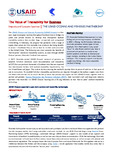| dc.contributor.author | USAID Oceans and Fisheries Partnership | |
| dc.date.accessioned | 2021-05-18T07:48:48Z | |
| dc.date.available | 2021-05-18T07:48:48Z | |
| dc.date.issued | 2019-06-19 | |
| dc.identifier.citation | USAID Oceans and Fisheries Partnership. (2019). Case Study: The Value of Traceability for Business (PT. Nutrindo). | en |
| dc.identifier.uri | http://hdl.handle.net/20.500.12067/1658 | |
| dc.description | In 2017, Nutrindo joined USAID Oceans’ network of partners to establish full-chain electronic catch documentation and traceability (eCDT) for tuna products harvested in Southeast Asia that are imported into international markets with seafood traceability requirements, like the United States and Japan. This is done by documenting the seafood’s journey from its point of catch to its final point of sale to consumers. To establish full chain traceability, partnerships are required throughout the seafood supply chain, from the fishers who are the first to touch the fish to those that process and export the fish. USAID Oceans, together with its partner and grantee, Yayasan Masyarakat dan Perikanan Indonesia (MDPI), have recruited small- and large-scale industry partners—like Nutrindo—in USAID Oceans’ learning site at Bitung, Indonesia to test “bait to plate” seafood traceability technology. | en |
| dc.language.iso | en | en |
| dc.subject | Catch Documentation and Traceability | en |
| dc.subject | tuna | en |
| dc.subject | Yayasan Masyarakat dan Perikanan Indonesia (MDPI) | en |
| dc.subject | bait to plate | en |
| dc.title | Case Study: The Value of Traceability for Business (PT. Nutrindo) | en |
| dc.type | Other | en |

